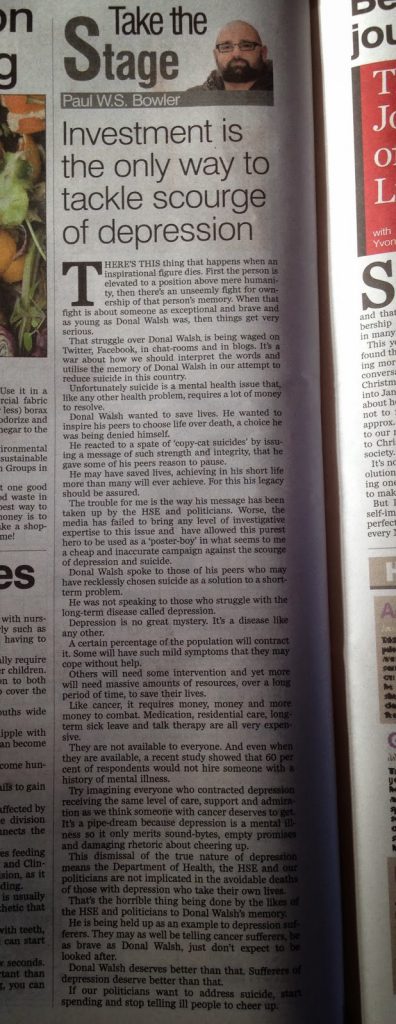My column in The Kerryman. 15 January, 2014
There’s this thing that happens when an inspirational figure dies. First the person is elevated to a position above mere humanity, then there’s an unseemly fight for ownership of that person’s memory. When that fight is about someone as exceptional and brave and as young as Donal Walsh was, then things get very serious.
That struggle over Donal Walsh is being waged on Twitter, Facebook, in chat-rooms and on blogs. It’s a war about how we should interpret the words and utilise the memory of Donal Walsh in our attempt to reduce suicide in this country. Unfortunately, suicide is a mental health issue that, like any other health problem, requires a lot of money to resolve.
Donal Walsh wanted to save lives. He wanted to inspire his peers to choose life over death, a choice he was being denied himself. He reacted to a spate of ‘copy-cat suicides’ by issuing a message of such strength and integrity, that he gave some of his peers reason to pause. He may have saved lives, achieving in his short life more than many will ever achieve. For this his legacy should be assured.
The trouble for me is the way his message has been taken up by the HSE and politicians. Worse, the media has failed to bring any level of investigative expertise to this issue and have allowed this purest hero to be used as a ‘poster-boy’ in what seems to me a cheap and inaccurate campaign against the scourge of depression and suicide.
Donal Walsh spoke to those of his peers who may have recklessly chosen suicide as a solution to a short-term problem. He was not speaking to those who struggle with the long-term disease called depression.
Depression is no great mystery. It’s a disease like any other. A certain percentage of the population will contract it. Some will have such mild symptoms, that they may cope without help. Others will need some intervention and yet more will need massive amounts of resources, over a long period of time, to save their lives.
Like cancer, it requires money, money and more money to combat. Medication, residential care, long-term sick leave and talk therapy are all very expensive. They are not available to everyone. And even when they are available, a recent study showed that 60% of respondents would not hire someone with a history of mental illness.
Try imagining everyone who contracted depression receiving the same level of care, support and admiration as we think someone with cancer deserves to get. It’s a pipe-dream because depression is a mental illness so it only merits sound-bytes, empty promises and damaging rhetoric about cheering up.
This dismissal of the true nature of depression means the Department of Health, the HSE and our politicians are not implicated in the avoidable deaths of those with depression who take their own lives. That’s the horrible thing being done to Donal Walsh’s memory.
He is being held up as an example to depression sufferers. They may as well be telling cancer sufferers, be as brave as Donal Walsh, just don’t expect to be looked after.
Donal Walsh deserves better than that. Sufferers of depression deserve better than that. If our politicians want to address suicide, start spending and stop telling ill people to cheer up.




